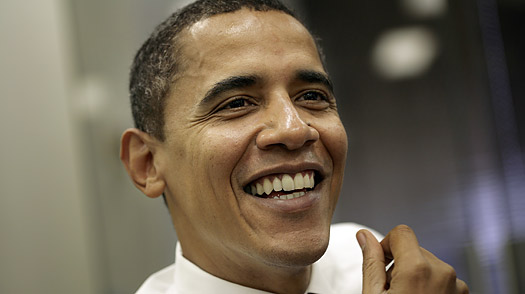
(5 of 6)
Obama opened the meeting by reflecting on his dilemma: act now or wait until January? By the end of the session, he had concluded that, like it or not, he must "accelerate all of our timetables," as he put it, "in appointments not just on the Cabinet but also our White House team, in structuring economic plans so that we can start getting them to Congress and hopefully begin work — even before I'm sworn in — on some of our key priorities around the economy, on laying the groundwork for a national-security team that can take the baton in a wartime transition." There was no time for the "traditional postelection holiday." Vacations would have to wait until Christmas.
Transition is such a gentle word. We make the transition from youth to adulthood or from the dinner table to the den. For Obama, though, the concept was freighted with danger. "He was very focused on the basic perils of the gap between the election and the Inauguration, at a time when the economy was clearly deteriorating and the markets were very fragile," Geithner explains. In certain powerful respects, Obama felt compelled to begin his presidency immediately. Markets needed to size up his economic team and hear what he planned to do. Congressional leaders, contemplating a colossal economic-stimulus package, needed to know where he was headed. Military leaders, key allies and opportunistic enemies were all keen to know just how dovish the anti-Iraq-war President intended to be. Obama concluded that hanging back would create a dangerous leadership void in the short-term and compound his troubles come January. And nothing that has happened since that Nov. 7 decision — the crisis at Citigroup, the drama of the automakers or the assault on Mumbai — has made the transfer of power look any less perilous.
He could not have predicted when he set out to become President that he would face such circumstances. The distance from the birth of his campaign to these first days of his fledgling presidency could be counted in months but measured in light-years. When he announced his candidacy on a frigid morning in Springfield, Ill., in 2007, Iraq was a disaster, and the Dow was still headed upward past 14,000. So this moment was a test not only of his speed but also of his flexibility. Obama proved lithe, indeed, persuading Robert Gates, Bush's Secretary of Defense, to remain in his post and asking Clinton, a constant critic of Obama's foreign policy views during their primary battle, to be his Secretary of State. Priority 1 was the economic team, however. There his task was to find a mix of people familiar enough to signal stability but fresh enough to promise change, and to design a stimulus strategy dramatic enough to inspire markets to swallow their panic. (See pictures of Obama's White House team.)
In the days leading up to Thanksgiving, Obama delivered. Having promised to govern from the middle, he rolled out a bright purple team of economic advisers, neither red nor blue. Geithner had served in various posts under both Bush and Bill Clinton. As president of the New York Fed, he was well known to Wall Street but relatively unknown on Main Street — just the blend of experience and newness that Obama was seeking. His budget director, Peter Orszag, had fans across the political spectrum, and his in-house oracle, Volcker, was a Democrat who fought inflation alongside Ronald Reagan. Larry Summers, named to run the economics team from the White House, was a Clinton stalwart.
Unveiling these and other picks at a series of daily press conferences, Obama assured the public that he wanted to move fast, so fast that trainloads of money might be ready for him to dispatch across the country with a stroke of his pen on Inauguration Day. The idea of another wave of spending horrifies America's surviving conservatives, but most economists support it — some with enthusiasm, some with resignation. Obama realized that the stimulus package could be a vehicle for launching his broad domestic agenda. His ambitious campaign promises — to reform health care, cut taxes for low- and moderate-income earners and steer the U.S. toward a new energy economy — had seemed doomed by the yawning budget deficit (some $200 billion a month, according to the latest projections). But call these projects "stimulus," and suddenly a ship headed for the reef of economic disaster might sail through Congress flying the flag of economic recovery. With even Republican economists talking about hundreds of billions in new spending, the sky's the limit. A dream of health-care reformers — electronic medical records — is now economic stimulus because Obama will pour money into hospitals for computers and clerical workers. His tax cut is stimulus because it puts spending money in the pockets of working Americans. His pledge to repair the nation's infrastructure is a stimulus plan for construction workers, while his energy strategy is stimulus for the people who will modernize government buildings, update public schools and improve the electrical grid.